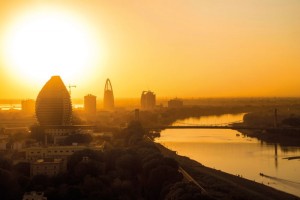 Khartoum’s doors open for international investment amidst wealth of opportunities
Khartoum’s doors open for international investment amidst wealth of opportunities
Safety and security may not be the first words that come to mind when thinking about Sudan, especially given the portrayal the country gets from global media coverage. But the reality of the situation is that they should be. Sudan is a modern, dynamic, safe and vibrant country, and, most importantly, it is host to a vast number of prime investment opportunities which have exploded over the past couple of years and look set to expand even further in the future.
What is so unique about Sudan is that it is a relatively virgin territory with a lot of potential. What’s more, the government has become increasingly keen to have an economy which is both diverse in terms of industry and efficient in terms of conducting business. This has resulted in a vast increase in the ease of doing business in Sudan, which in turn has led to a surge in investment in a myriad of different industries, with mining, agriculture, tourism and solar energy being the most notable areas. Ultimately, recent government initiatives combined with little prior knowledge of the country on the part of investors mean that now is the perfect time to invest.
The Minister of Tourism Mohamed Abozid states that Sudan is a safe place to both visit and invest.
According to him, the conflicts that dominate the news coverage of Sudan and give it such a bad reputation are “between tribes that are far from here”. And while there are small conflicts in certain areas, he says that, “Khartoum, the capital city, is the safest city in the Middle East”.
This strong statement has been backed and supported by foreign tourists who say that Sudanese people are generous and welcoming, meaning that all tourists feel very safe, welcome and relaxed.
The government, meanwhile, is taking real steps towards making business and investment in Sudan easier, by streamlining processes and stripping away unnecessary red tape. Current incentives, such as exemptions from tax duties and customs introduced for capital groups to boost corporate profit margins, are something that you simply will not find elsewhere.
And although investment in an untouched country like Sudan is often made very difficult by numerous bureaucratic delays and the interference of a seemingly unending number of state bodies, this is also something that the Sudanese government has taken particular care to avoid, notably with the passing of a new investment law in 2014. The bill, for example, has created a much more decentralized investment structure, with each of Sudan’s 18 states having its own investment authority, thereby increasing investor access to regulatory bodies, as well as improving transparency, accountability and efficiency. “This is part of our duty: to establish a ‘one stop shop’, bringing all these departments together for the investor,” explains State Minister of Investment, Osama Faisal Elsayed Ali.
As a result of the government’s new found determination to make doing business in Sudan easier, the World Bank estimates that the cost of starting a business as a percentage of GNI per capita has fallen from over 100% in 2005 to 25.1% today, making it one of the easiest countries in which to start a business in Africa.
“I advise all investors to visit Sudan, first of all. Seeing is believing. Opportunities are huge, particularly in areas like food security. There’s also a very big opportunity for investors to invest in areas of energy, which is a sector that is related to both agriculture and mining”
“This is part of our duty: to establish a ‘one stop shop’, bringing all these departments together for the investor”Osama Faisal Elsayed Ali,
State Minister of Investment
Indeed, following the development of a specialized department for investment and the creation of a detailed investment master plan for the country, Sudan has numerous economic success stories: a booming animal feed industry, a rapidly developing solar power infrastructure, gold exports worth $3 billion a year and some of the most pristine archaeological and natural wonders in the world.
Sudan’s new found economic focus however is not just restricted to exportation, but also the development of human capital and the country as a whole. This is something the government has come to realize, and has significantly increased its investment in education. The spike in the number of children of primary school age enrolling in education is testament to this, rising from 46% in 2003 to beyond 70% in 2013, according to a study by the Ministry of Education.
The results of this economic revolution are already clear: Sudanese GDP has grown seven-fold from around $10 billion at the start of the millennium in 2000, to over $70 billion today, according to The World Bank. Likewise, GDP per capita, which was at $350 in 2000, has shot up to nearly $2000 today. While such growth is astonishing, what is clear is that, given the current nature of the Sudanese economy, such rates are likely to increase in the coming years.
The government and, more specifically the Ministry of Investment are working very hard to attract investment, ensuring that the laws concerning the investment climate regarding land, taxes and customs are very suitable and encouraging, as well as ensuring the ease of moving money into the country. “If you want to invest in Sudan, everything is on your side,” says Minister Abozid. Given what Sudan has to offer, investors are advised to explore this new frontier before it is too late.















